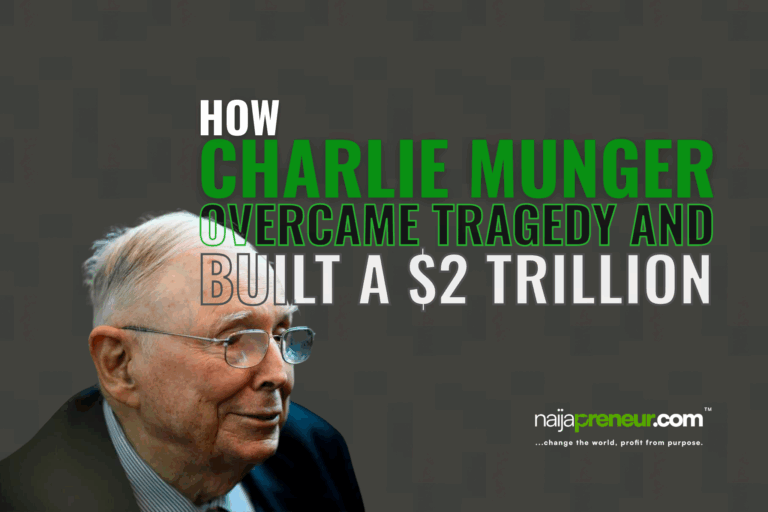He lost his eye. Buried his 9-year-old son. Endured a painful divorce. Was broke in his 30s.
Then, at 58, he became a billionaire.
This is the story of Charlie Munger—and how he turned unimaginable suffering into one of the greatest investment empires in history.
The Early Struggles: A Life of Hardship
Charlie Munger wasn’t born into wealth or privilege.
He studied mathematics at the University of Michigan but dropped out to serve in World War II. During his service, he developed a severe eye infection that led to surgical removal of his left eye at just 21 years old.
After the war, with no undergraduate degree, he charmed his way into Harvard Law School—graduating magna cum laude.
For a while, life seemed to stabilize. He built a legal career, got married, and had three children.
But fate wasn’t done testing him.
The Unthinkable Tragedy
In 1955, his 9-year-old son, Teddy, was diagnosed with leukemia—a death sentence at the time.
Munger spent months watching his child waste away in pain. There was no treatment. No hope.
Years later, he would describe the experience with heartbreaking simplicity:
“You just have to endure it.”
A year later, his marriage collapsed.
Now in his early 30s, Munger was:
-
Broke (at one point, he was denied credit for a pair of shoes)
-
Half-blind
-
A grieving single father
Most people would have broken. Munger reinvented himself instead.
The Turning Point: A Mindset Revolution
Munger didn’t believe in blind hustle. He believed in thinking better.
He devoured books on psychology, economics, biology, and philosophy—building what he called his “latticework of mental models.”
His goal?
To become so rational that no setback could destroy him again.
The Buffett Partnership That Changed Everything
In his 50s, Munger met Warren Buffett.
At the time, Buffett was focused on buying cheap, undervalued stocks—what Munger called “cigar butt” investing (picking up discarded businesses with one last puff of value).
Munger challenged him:
“Forget cheap crap. Buy wonderful businesses at fair prices instead.”
That one shift transformed Buffett’s strategy—and the future of Berkshire Hathaway.
Together, they:
-
Acquired See’s Candies (a deal that became the blueprint for future investments)
-
Built Blue Chip Stamps into a cash-generating machine
-
Turned Berkshire from a failing textile mill into a $2 trillion empire
From $19 per share in 1965 to over $600,000 per share today, their partnership became the greatest wealth-creation engine in history.
Buffett later admitted:
“Charlie says the things I’m too smart to say. He’s the blunt instrument of Berkshire.”
Munger wasn’t just Buffett’s partner—he was the soul of Berkshire Hathaway.
The Munger Philosophy: How to Win the Long Game
By 58, Munger was financially free—but he never stopped learning.
He became the philosopher of capitalism, preaching a simple but powerful mindset:
-
Master the game of thinking
-
“The best thing a human being can do is help another human being know more.”
-
-
Ignore what doesn’t matter
-
“The big money is not in the buying and selling… but in the waiting.”
-
-
Play long-term games with long-term people
-
“You don’t have to be brilliant, only a little bit wiser than the other guys… for a long, long time.”
-
His ultimate lesson?
“Spend each day trying to be a little wiser than you were when you woke up.”
The Lesson for Entrepreneurs Today
Munger’s life proves that success isn’t about avoiding pain—it’s about learning from it.
Most people crumble under setbacks.
The great ones use suffering as fuel.
Three Takeaways for Your Own Journey:
-
Build Mental Resilience
-
Munger didn’t just read books—he rewired his brain to think differently.
-
-
Focus on Quality Over Quick Wins
-
Buffett was a good investor. Munger made him a legend by shifting to long-term quality.
-
-
Compound Wisdom, Not Just Money
-
Munger’s real wealth wasn’t his billions—it was his lifetime of learning.
-
Final Question: What’s Your Latticework?
Munger turned tragedy into triumph by thinking differently.
The question is:
Are you building a mind strong enough to handle your dreams?
Because in the end, the greatest investment you’ll ever make is in yourself.

